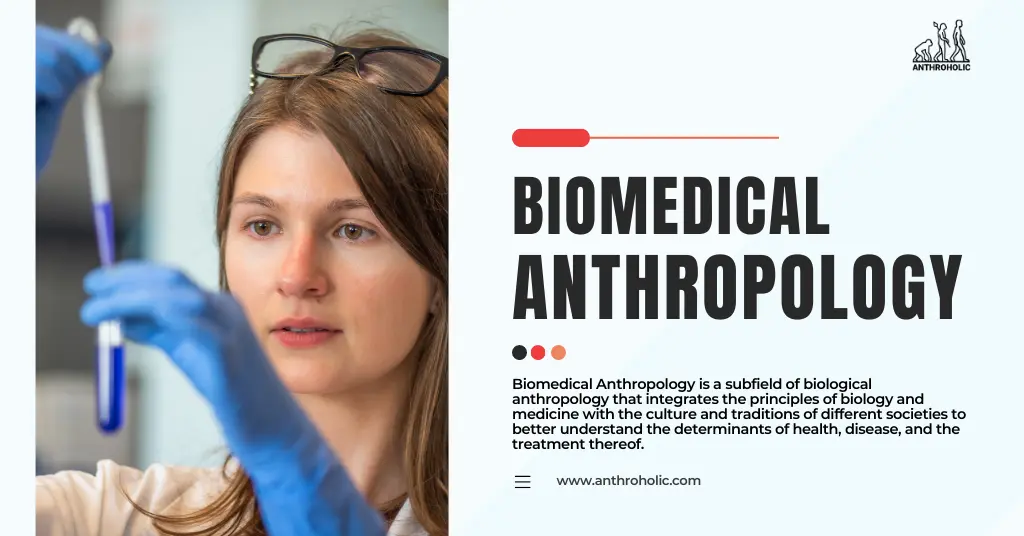AI Answer Evaluation Platform Live Now. Try Free Answer Evaluation Now
Biomedical Anthropology
Biomedical Anthropology is a subfield of biological anthropology that integrates the principles of biology and medicine with the culture and traditions of different societies to better understand the determinants of health, disease, and the treatment thereof [1]. This unique discipline explores the interaction of genetic, environmental, and cultural factors in shaping human health outcomes.

Overview of Biomedical Anthropology
Biomedical Anthropology investigates both the biological and sociocultural aspects of health, illness, and healthcare in different populations. The study includes:
- How biology affects health: By studying genetic and epigenetic influences, the relationship between human biology and health becomes clearer.
- How culture affects health: By examining health beliefs, practices, and healthcare systems in different cultures, we can understand the role of culture in health outcomes.
- How the environment affects health: By investigating factors such as diet, pollution, and other environmental influences, the impact of external conditions on health can be explored [2].
This interdisciplinary field offers a holistic view of health and illness, bridging the gap between traditional medicine and anthropology.
Biomedical Anthropology: Key Areas
Genetic and Epigenetic Influences
Humans have a diverse genetic composition that influences their susceptibility and resistance to various diseases. Biomedical anthropology analyzes genetic variations, how they contribute to health differences, and how epigenetic factors modify these variations. Research includes studying genetic mutations and variations linked to specific diseases like cancer, cardiovascular disease, and diabetes [3].
Cultural Practices and Beliefs
Biomedical anthropology examines the cultural context of health, including traditional practices, beliefs, and societal norms. The cultural norms often shape health behaviors and the perception of illness, influencing the efficacy of treatment methods [4].
Environmental Factors
Human health is significantly affected by environmental conditions. Factors like exposure to pollutants, climate change, diet, and physical activity play a pivotal role in determining health outcomes. Biomedical anthropology studies how these environmental influences interact with genetic factors to impact health [5].
| Key Areas | Focus |
|---|---|
| Genetic and Epigenetic Influences | Genetic mutations and variations |
| Cultural Practices and Beliefs | Health behaviors and perceptions |
| Environmental Factors | Pollutants, climate, diet, and physical activity |
Implications of Biomedical Anthropology
Biomedical anthropology has profound implications for both medicine and public health:
- Improved Understanding of Health and Disease: It enables a comprehensive understanding of health and disease by considering both biological and cultural factors. This insight helps to create more effective and personalized treatment plans.
- Informing Health Policies: By analyzing societal and cultural norms and their impact on health, biomedical anthropology can guide the formulation of culturally sensitive health policies and interventions.
- Promoting Health Equity: It can also address health disparities by shedding light on the social determinants of health and suggesting ways to mitigate them.
Advances in Biomedical Anthropology
Biomedical Anthropology is increasingly acknowledged for its relevance in our evolving healthcare landscape. Recent advances have further propelled the field:
Evolutionary Medicine
This area focuses on how human evolution has shaped disease vulnerability. For example, humans’ genetic predisposition to store fat was an advantage during periods of food scarcity in early human history, but in today’s calorie-rich environment, it contributes to the obesity epidemic.
Epigenetic Research
Biomedical anthropology is instrumental in epigenetic research, highlighting how lifestyle and environmental factors can turn genes “on” or “off”. This line of research opens doors for interventions designed to prevent disease by modifying these triggers.
Pharmacogenomics
The field contributes to pharmacogenomics by exploring genetic variations that affect drug metabolism. This research can lead to personalized medicine, ensuring patients receive the most effective medications for their genetic profiles.
Applications in Public Health
Biomedical Anthropology informs public health policy and interventions in a number of ways:
- Cultural Sensitivity: It ensures public health measures are culturally sensitive, enhancing their acceptance and effectiveness.
- Health Promotion: Insights from biomedical anthropology inform the design of health promotion campaigns, taking into account cultural practices and beliefs.
- Addressing Health Disparities: By uncovering the complex interplay between genetic, environmental, and cultural factors, biomedical anthropology can help target interventions to reduce health disparities.
Limitations and Future Directions
While biomedical anthropology has made significant contributions to our understanding of health and disease, there are limitations. The field often lacks quantitative data due to its qualitative focus, and ethical issues can arise when studying culturally sensitive health practices.
The future of biomedical anthropology promises further integration with other disciplines and technologies, such as genomics, epidemiology, and artificial intelligence, to offer a more nuanced understanding of health, disease, and treatment.
Conclusion
Biomedical Anthropology provides an essential platform for a holistic understanding of health and disease, intertwining biological, environmental, and cultural perspectives. Through its approach, this field offers meaningful insights for disease prevention, intervention strategies, and public health policies. As the field continues to evolve and adapt to our changing world, it will play an increasingly vital role in global health.
References
[1] Singer, M., & Erickson, P. I. (2013). A Companion to Medical Anthropology.
[2] Armelagos, G. J., & Dewey, J. R. (2017). Biocultural Synthesis in Health and Disease.
[3] Goodman, A., & Leatherman, T. (1998). Building a new Biocultural synthesis.
[4] Mendenhall, E., & Dulin-Keita, A. (2012). Cultural competency and the practice of medicine in the US.
[5] Hruschka, D. J., Hadley, C., & Brewis, A. (2013). Population health and environment: A synthesis of research findings.




